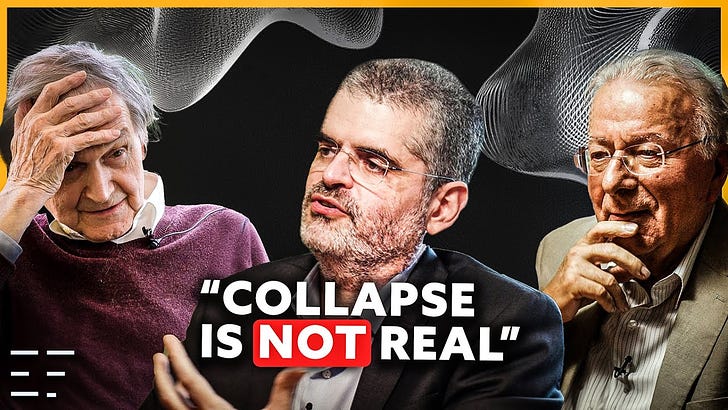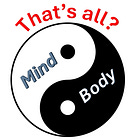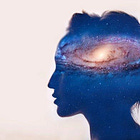Consciousness, Free Will, Meaning, and the Quantum
Roger Penrose, Federico Faggin, and Bernardo Kastrup in a fascinating and interdisciplinary conversation.
This is one of the best conversations I have seen so far about the conjectures regarding the relationship between consciousness, free will, cognition and quantum mechanics. While these speculations are very popular, they are almost always reduced to a few slogans that don’t mean much, and are usually dominated by hardliners of a strictly materialistic worldview. While those more open to a trans-material worldview usually fall into new age woo mostly confusing the general audience with misunderstandings that perpetuate myths that have nothing to do with reality.
Not so here. Roger Penrose (Physics Nobel laureate), Federico Faggin (inventor of the first commercial microprocessor), and Bernardo Kastrup (well-known philosopher and proponent of analytic idealism) take their time to reflect on the deeper meaning of their understanding of the ontology of consciousness, mind, free will, and quantum physics. While this conversation remains largely within a Westernized and scientific framework, it—along with my linked posts—could serve as a speculative exercise, bridging these discussions with an integral panentheistic and evolutionary metaphysics primarily (but not exclusively) rooted in the vision of Sri Aurobindo, and opening pathways to deeper understandings of reality that transcend traditional boundaries.
This integral cosmology represents a much deeper level of existence, of which a fringe minority of scientists and philosophers are beginning to intuit a small part. It might be better to start with the basics from a scientific, yet speculative and philosophical, perspective rather than jumping straight into a full-fledged metaphysical cosmology. In this sense, this conversation serves its purpose well.
Therefore, this is not going to be a quick, few-minute video and reading; but those who engage with all the material will gain a bird's-eye view of a metaphysics that, in my opinion, goes far beyond the established discourse in the philosophical and scientific communities. Moreover, since it is a discussion among experts, even though they try to address a general audience, you might need some technical background to fully grasp the context. But don’t panic—I have described some of the aspects they discuss in the linked posts added in the essay.
In this post I will add some observations, and insert myself as a virtual fifth participant (I don't have the same authority as they do to be present in these debates, but I believe I could contribute equally valuable points). The aim is to show how often we are caught in false dichotomies that dissolve once we look upon it from a different viewpoint and disengage ourselves from old thought patterns, mostly rooted (more or less subconsciously) in a mechanistic third-person perspective.
First of all, let me begin by pointing out a little historical detail that the moderator gets wrong just from the first sentence. Physicist’s explicit link between quantum mechanics, consciousness, and free will, is a very old idea, and it certainly did not begin with Penrose. It dates back to the 1930s, that is, the times of Arthur Eddington, Arthur Compton, and Pascual Jordan (for an overall historical account, see Koznjak, somwhere there is also a free pdf.) As a matter of fact this isn’t a new hypothesis, but it has been ignored for about six decades.
At 22:18 Faggin points out that it is consciousness and free will that account for the collapse of the wave function. This is the only way to explain the (non-computable) purely random quantum process. Faggin’s and d’Ariano’s theory is quite complicated (physicists, can find it here.) In essence, it says that quantum superposition is a state of consciousness, while Penrose maintains that consciousness is caused or generated by the opposite process—that is, the collapse of the wavefunction. For more on this latter issue, and more in general on quantum physics, see my fast overview here.
I was partially inspired by Faggin’s approach and dwelled deeper into the question of how a supposedly random process could be connected to an idea of free will that shouldn’t behave randomly, and wrote a couple of articles, that I summarized in this this post (or, see the original papers here and here.)
I believe these complement and clarify some of his arguments.
At 37:08 and later about 1:08:25, Faggin observes that consciousness without free will—that is, consciousness without any causal power—makes little sense. After all, what is the function of consciousness in evolution if it is unnecessary and makes no difference? It is indeed a good point, because if this were the case, we would have to conclude that we are merely passive observers, with no power to intervene in anything. We would be nothing more than puppets, slaves to the forces of Nature. In the next post, we will explore how this might indeed be the case, yet still be compatible with the idea that there is something within us that can be freed. However, at 1:13:43 the moderator made a very interesting observation pointing out that even if our will has no practical effect or purpose in the world or on ourselves, we can still experience the joys and sorrows of life like in a movie theatre. This reminded me of Sri Aurobindo’s assertion that the ultimate reason for our existence is the 'delight of being.’
But the question nobody asks is: whose will are we talking about? Simply replying 'my will' doesn’t clarify much. Who or what is this 'me'? Is it the will of the mind? The will of our instinctual (often crude and primitive) urges? Or is it the will of the heart, which has a nature deeper than the mind, detached from its vital appetites and cravings? And what is will supposed to be free from? These are all questions we seldom ponder, and then wonder why so many paradoxes and mysteries arise. That’s why Penrose says at 1:11:33 “I don’t really know what it means” but that it must be something different from randomness and assumes that we are free since we “use our consciousness” to make free choices (strange word choice: is there another subject that isn’t conscious and “uses consciousness”? If I “use my consciousness,” who then am I? I preferer to believe that “I am consciousness”!) But, at 1:14:18, in my view, also Kastrup isn’t aware of the confusion when he talks about “our,” “my” free will, and says “I am making determinations.” Again, who or what is that 'me,' 'us,' or 'I' that makes decisions? Is it the body? The brain? Or are we adopting a dualist perspective, where personhood is conceived as a mind that exists beyond the brain? Or are we referring to an immaterial soul? If this is not clear and we throw everything together into one pot, obviously the notion of free will becomes fuzzy as well, leading us into confusion and paradoxes. I explored this point in more detail here.
Many people (not just materialists) might argue that we believe we are free to do what we want, but this also is an illusion. We aren't truly free. After all, where does that 'want' come from? Or, worse, those little “me,” “I,” “you,” or “ego,” could well be an illusion itself (something frequently stated in the Eastern tradition) and, thereby, there isn’t anyone to be freed from in the first place. That’s why we ultimately perceive a deeper truth in Schopenhauer’s “I can’t will my will.” That’s why the issue appears so stuck into a logical circularity. The analytic mind struggles to accept and comprehend this, but sooner or later, we will need to reconsider whether free will is related to self-causation or whether it might not exist at all.
Self-determination is the only ‘process’ that can make sense of the notion of free will (more on this in a forthcoming post).
At 40:30, Penrose points out a common misinterpretation of quantum mechanics: there is no such thing as the 'observer effect' in quantum physics. I have discussed this in detail here.
Unfortunately, this misconception has been repeated for decades, and has taken on a life of its own, making it difficult to convince people that it is merely a myth. However, the idea that consciousness causes the quantum collapse of the wave function is compatible with quantum mechanics only if we abandon the notion that our consciousnesses are separate, divided entities and, instead, consider the hypothesis that our consciousness is an 'individuation' or 'exclusive concentration' of a universal consciousness (again, see here.)
At 44:38: If you wonder what that “epistemic” vs. “ontic” or “ontological” distinction is about (or, as Penrose puts it, the difference between “ascertaining” and “confirming” a fact,) you can read a couple of paragraphs I once inserted in the same post as above here.
At 13:45 and 54:21, the discussion revolves around the question of how our mind, which supposedly emerged in a meaningless physical universe, can transition from syntax to meaning-making semantics. There is an explanatory gap between a symbol or the representation of a sensation, and the experience of the sensation itself. You might be interested in my last post where I clarified this point, explaining why there will be no AGI without a conscious AI.
This may sound like a vague and obscure philosophical debate, but is a central point that goes to the heart of our true nature. It is a subtle but fundamental distinction that also smart people fail to understand (in fact, my impression is that Penrose didn’t understand what the real issue is.) A lack of awareness here causes deeper problems—not just philosophical ones, but also issues that obstruct the spiritual evolution of humankind.
At 1:17:55, Penrose finally makes a good observation that I feel most people often miss. We are so accustomed to the “on/off binary thinking” and never considering that reality may stand in-between. Some philosophers of mind and biology speculate whether a plant or a bacterium might be conscious, and expect a yes or no answer. However, maybe consciousness is not something that turns on and off like a light bulb. Perhaps it exists in a variety of kinds and degrees. A cell or a plant are unlikely to be conscious like we are, but they could still possess an elementary form of ‘proto-consciousness.’ As long as we think in terms of dichotomies that allow only for an all-or-nothing answer, the usual paradoxes and inconsistencies will continue to emerge. It is a thought pattern we inherited from a Cartesian dualism. It is time to go beyond dualism.
At 1:22:07, they reiterate the syntax vs. semantics problem (so it seems I’m not the only one fixated on this issue; they sense that something very deep is going on here). Faggin emphasizes again that what distinguishes natural consciousness from a machine processing system isn’t only the ability to be sentient, to have feelings, and to experience, but he also relates it to semantics—the ability to share symbols that have meaning. The emergence of meaning isn’t computational, no matter how powerful and complex your AI system may be. As Kastrup perfectly puts it, the fact that a computer can simulate human intelligence so well isn’t surprising; it has been trained by humans to process the same words, symbols, and tokens within their relationships. Does the machine feel what it is like to process tokens, manipulate symbols, and associate them with meaning, as humans do? We somehow know what it feels like, not just to apprehend but especially to comprehend the deeper meaning and significance of the data our sensory perceptions and brain process. If we truly believe a machine feels and does what we do, then we have fallen into the reversal-of-roles trap: instead of recognizing that consciousness may be a fundamental aspect of the universe, we tend to reduce Nature and ourselves to a mere mechanistic conception, representing us as blind machines with no free will—in my opinion an attitude that has caused so much harm and suffering. Penrose doesn’t disagree, but I think he comes from a very different perspective. He agrees that what we call 'understanding' is not computation; one must be conscious to understand. However, he is more conservative and still believes that the transition from syntax to semantics may still be naturalizable. I once wrote another two-parts essay on why this transition from syntax to semantics is the main hurdle toward AGI (with a description of Searle’s Chinese Room thought experiment.)
So far, so good. It was an interesting exchange of ideas, but it gave me the impression that it only scratched the surface. It’s an intellectual exercise that may help people realize that the materialistic worldview isn’t necessarily wrong but rather superficial. Things won’t fit neatly into the straitjacket of rationalistic naturalism. Humans will sooner or later be forced to acknowledge that a trans-rational and trans-material worldview will become unavoidable. Therefore, I would like to complement their views with a metaphysical perspective.
The fundamental difference between Penrose on one side, and Faggin and Kastrup on the other, is that they do not specify whose consciousness we are talking about. Penrose still thinks in terms of a personal, individual subjective consciousness (eventually reducible to some low-level machinery that ‘causes,’ ‘produces,’ ‘generates,’ ‘creates’ it, or makes it ‘emerge’). It’s only about my, your, his, or her consciousness. Faggin and Kastrup, however, think more in terms of a universal consciousness (or ‘Mind at Large’)—that is, they posit consciousness as something fundamental and irreducible, of which our little egos are only a mental ‘localization,’ or, as Kastrup sees it, as a ‘dissociation of universal mind.’ Unfortunately, they haven’t emphasized this much here (sometimes I get the impression they don’t realize how they inadvertently fall back into the conventional view). I have explored this mystical insight in detail in a long X-part essay, which you can begin reading here.
When Faggin talks about the “semantic aspect of reality” or the “quantum field as a symbolic aspect of its inner conscious semantic aspect of reality,” I believe he is intuiting a much deeper truth that he struggles to articulate. In fact, one could go further and conceive of a vast, illimitable, undefinable yet very concrete intelligence that permeates the world as a Real-Idea.
In this view, consciousness is fundamental, universal, and also expresses itself through an archetypal phenomenality that is a shadow of an ultimate sense-making Idea. Otherwise, as we have seen, it is precisely the sense-making that doesn’t make sense in a senseless universe. When this perspective is adopted, several aspects that were previously enigmatic or seemingly coincidental begin to make sense. I have also described here how a return to the intuition of the archetype, or the Goethean view of Nature, could help us see things in a new light. However, the deepest account that bridges the explanatory gap between words and meaning can be found in the visions of Abhinavagupta’s and Sri Aurobindo vision of the nature of language.
In light of this, I believe present attempts to create meaning-making machines appear quite naïve.
If you are still with me and have gone through all of this (I know… it’s heavy lifting that requires time and energy), you might take a step further and explore what a truly integral cosmology that unites science and spirituality could look like, as I have tried to outline here.
At any rate, what contemporary science and philosophy are slowly but steadily realizing is that, even though they are just scratching the surface and have only a small glimpse of the whole, everything indicates a gradual shift toward an integral spiritual vision. The analytic mind is far from seeing the big picture, but dialogues like these suggest that it is beginning to discover its own limitations and is preparing to transcend them. The conversation between Faggin, Kastrup, and Penrose is not so much interesting for its content as it is for what it reveals. We are a species on the verge of realizing the limits of the mind and transitioning to an intuitive/archetypal, trans-rational form of cognition. Our minds and brains are still mostly rooted in the outward-looking, rationalistic, third-person view of the world and ourselves. But this, too, will come to an end, as we are only transitional beings, not the ultimate step on the evolutionary ladder.
The subscription to Letters for a Post-Material Future is free. However, if you find value in my project and wish to support it, you can make a small financial contribution by buying me one or more coffees!















Thank you!! I've been wanting to dive deep into this interview since it first came up in my YouTube feed... I'm adding your article to my reading list once the capacity arrives, but just wanted to say THANK YOU!
Interesting !!
Haven’t seen this video before but have been working on an interdisciplinary theory myself on consciousness originally based on Penrose’s quantum theories but expanded from there.
quantumstreamtheory.substack.com